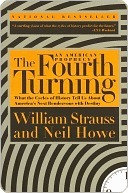In 1930, Stalin arrested the economist Nikolai Kondratieff and shipped him off to Siberia. His crime: daring to defy that most linear of ideologies—Marxism—by suggesting that the long-term performance of market economies is cyclical. Soon after his death in the gulag, Kondratieff became a cult figure to historical economists around the world. Today, his name is attached to a popular family of two-stroke economic “K-Cycles,” some traceable back to the fifteenth century and all having a periodicity of forty to fifty-five years.
Welcome back. Just a moment while we sign you in to your Goodreads account.


